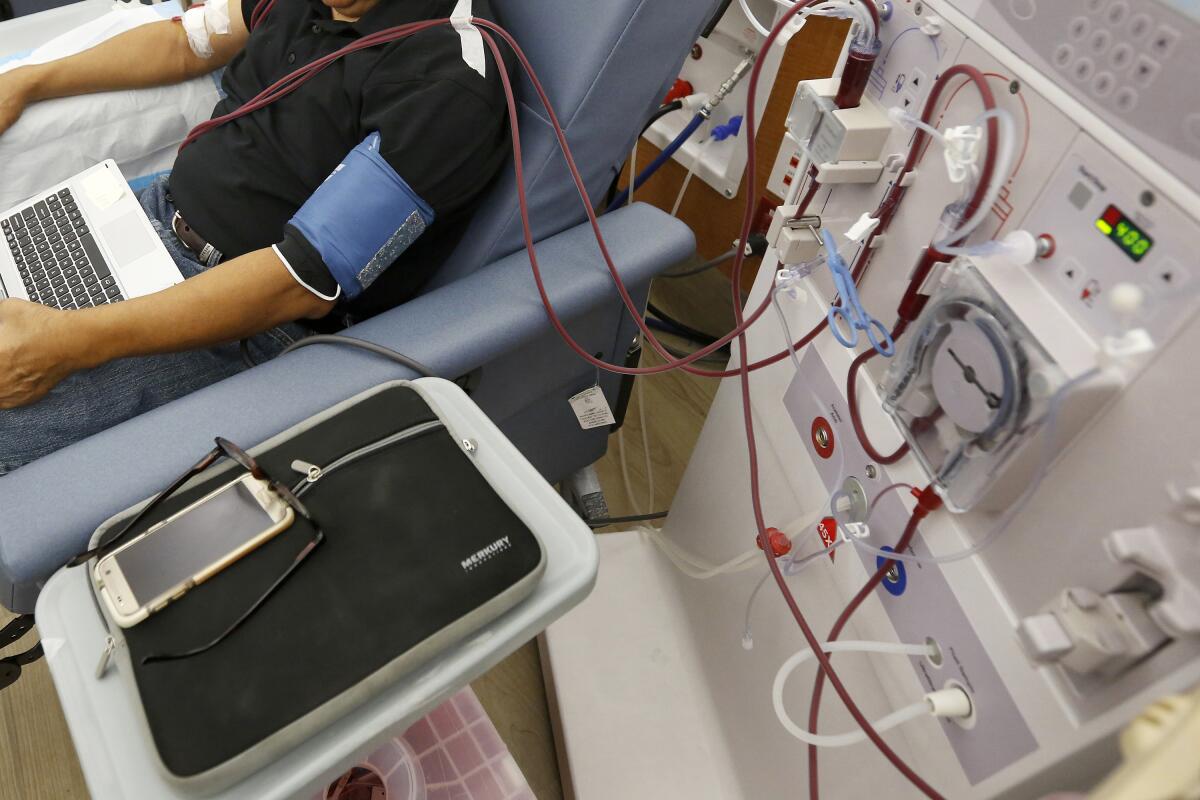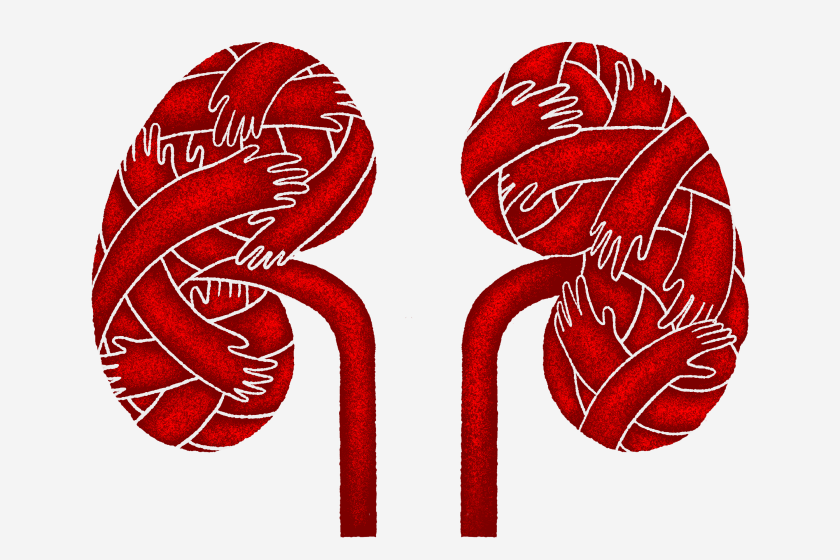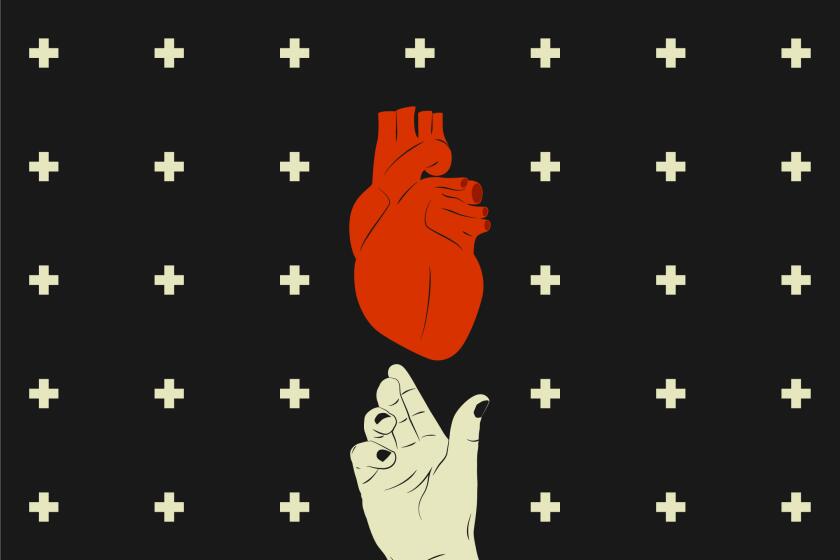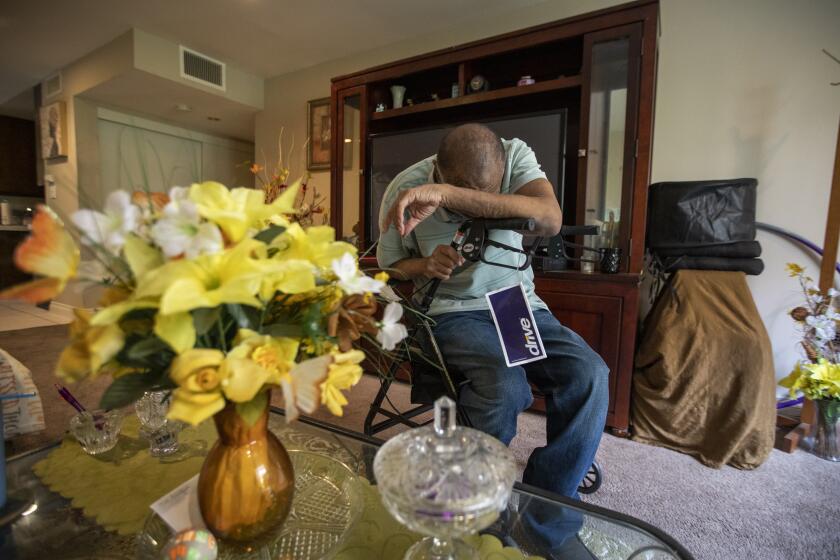Opinion: A single reform that could save 100,000 lives immediately

- Share via
Never in the field of public legislation has so much been lost by so many to one law, as Churchill might’ve put it. The National Organ Transplant Act of 1984 created the framework for the organ transplant system in the United States, and nearly 40 years later, the law is responsible for millions of needless deaths and trillions of wasted dollars. The Transplant Act requires modification, immediately.
We’ve got skin in this game. We both donated our kidneys to strangers. Ned donated to someone who turned out to be a young mother of two children in 2015, which started a chain that helped an additional two recipients. And Matt donated at Walter Reed in 2021, after which his kidney went to a Seattleite, kicking off a chain that helped seven more recipients, the last of whom was back at Walter Reed.
Ned founded, and Matt now leads, an organization that represents nearly 1,000 living donors, many of whom serve as mentors to those considering becoming donors. We ensure that each donor candidate is informed and protected to the greatest possible extent. When potential donors talk to a mentor, it roughly triples the likelihood they’ll donate.
My ‘non-directed’ donation, to someone I don’t know, saved one life and then some.
Still, eight years ago, when Ned donated, the number of living kidney donors was 6,000. With all the work we’ve done since, the number of living donors is still about 6,000 annually. In the United States, nearly 786,000 people suffer from end-stage kidney disease, more people than can fit in the 10 largest NFL stadiums combined.
End-stage kidney disease occurs when your kidneys can no longer properly filter your blood. If that happens, you either die, get a kidney transplant or go on dialysis. And if it’s the latter, the outcome is still either dying or surviving long enough to get a transplant.
More Americans die of kidney disease than of breast or prostate cancer, and one in three of us is at risk. This illness is widespread, but what makes it worse is the staggering financial burden borne by everyone. The head of the National Kidney Foundation testified in March that Medicare spends an estimated $136 billion, nearly 25% of its expenditures, on the care of people with a kidney disease. Of that, $50 billion is spent on people with end-stage kidney disease, on par with the entire U.S. Marine Corps budget.
About half the U.S. population, including 18 million Californians, are registered organ donors. But whether you can actually donate organs depends on how you die, among other limiting factors.
Increasing transplants is the solution to save lives. And every transplanted patient taken off dialysis saves society more than $1.6 million, according to a recent paper published in the medical journal Value in Health. When people acknowledge the kidney shortage, they may think, “I’m a registered organ donor. I’m doing my part.” Unfortunately, there’s a limit to deceased donation — the numbers don’t work. To be a deceased organ donor, you have to die in a very rare manner (only about 1% of deaths occur in a donation-suitable manner). Even if we maximized our registered organ-donation rate from 60% at present to 100%, we would only increase the available deceased-donated kidneys by about 12,000, compared with the 100,000-plus who qualify to be on the transplant wait list right now.
We’ve run out of options. The supply is nowhere near the demand for kidneys, and the gap is widening. Why not pay people to donate a kidney?
The National Organ Transplant Act prohibits compensating kidney donors, which is strange in that in American society, it’s common to pay for plasma, bone marrow, hair, sperm, eggs and even surrogate pregnancies. We already pay to create and sustain life.
Another way to think about this, as one bioethicist points out: “Every person in the chain of living organ donation, except one, profits.” The hospital gets paid, the doctors and nurses and staff get paid, the pharmaceutical industry gets paid and the recipient is the main beneficiary. Everyone benefits except the donors, who get reimbursed only for their expenses.
To have even a chance at a kidney from a deceased donor, an ailing patient needs to get onto the waiting list. But fewer Americans on dialysis have that chance.
The ethical concerns regarding compensation are straightforward. Nobody wants to coerce or compel those in desperate financial straits to do something they would not have done otherwise. The challenge, then — until artificial or nonhuman animal substitutes are viable options — is to devise a compensation model that doesn’t exploit donors.
Compensation models have been proposed in the past. A National Institutes of Health study listed some of the possibilities, including direct payment, indirect payment, “in kind” payment (free health insurance, for example) or expanded reimbursements. After much review, we come down strongly in support of indirect payment, specifically, a $100,000 refundable federal tax credit. The tax credit would be uniformly applied over a period of 10 years, in the amount of $10,000 a year for those who qualify and then become donors.
This kind of compensation is certainly not a quick-cash scheme that would incentivize an act of desperation. Nor does it commoditize human body parts. Going forward, kidney donation might become partly opportunistic rather than mostly altruistic, as it is now. But would it be exploitative? Not at all.
As prior donors, we would be ineligible for such a program. Some may question our ethical calculus, but we’d ask that those challenges be balanced against the deaths and losses certain to occur if the Transplant Act continues in its current form. We’d also ask that those who wish the act’s compensation rules to remain in place consider the wishes and hopes of someone, anyone, among the hundreds of thousands right now dying on dialysis.
We’re confident that modifying transplant law to permit a tax credit for living kidney donation is a safe and ethical way out of our national kidney crisis. We have the ability to eliminate unnecessary loss and pain. That’s a rare opportunity — we should seize it and save as many as we can.
Ned Brooks and ML Cavanaugh are living kidney donors, and Brooks is the founder of the Coalition to Modify NOTA.
More to Read
A cure for the common opinion
Get thought-provoking perspectives with our weekly newsletter.
You may occasionally receive promotional content from the Los Angeles Times.













